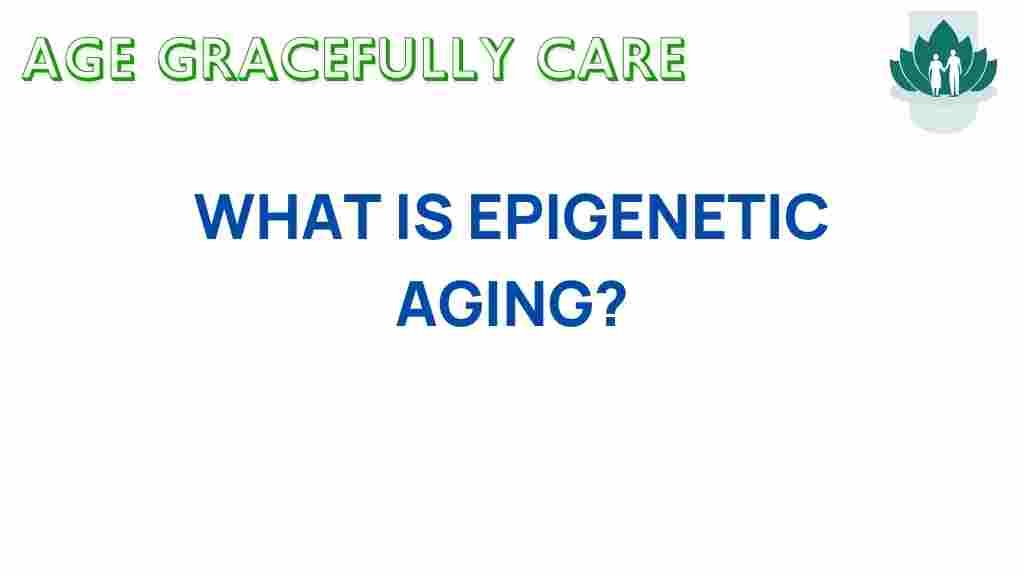Unraveling the Secrets of Epigenetic Aging
In recent years, the field of health and wellness has witnessed a revolutionary shift with the emergence of epigenetic aging as a focal point in understanding longevity. As we dive into the intricate relationship between genetics, environment, and lifestyle choices, we begin to uncover the secrets that may hold the key to cellular aging and improved health. The concept of epigenetic aging provides a fascinating perspective on how our DNA is influenced by external factors, ultimately impacting our overall well-being.
Understanding Epigenetic Aging
To fully grasp the concept of epigenetic aging, we first need to understand what epigenetics is. Epigenetics refers to the study of changes in gene expression that do not involve alterations to the underlying DNA sequence. These changes can be influenced by various factors, including lifestyle, environment, and even diet.
Unlike genetic mutations, which are permanent changes in the DNA sequence, epigenetic modifications are reversible. This means that our choices and surroundings can have a profound effect on how our genes function, potentially accelerating or slowing down the aging process. Epigenetic aging, therefore, is a reflection of the biological age of an individual based on these modifications rather than their chronological age.
The Role of Genetics in Aging
While epigenetic factors play a significant role in aging, it is essential to recognize the foundational impact of genetics. Our genetic makeup lays the groundwork for how we age, influencing susceptibility to age-related diseases, cellular aging processes, and overall longevity. Key genetic factors affecting aging include:
- Telomeres: These protective caps on the ends of chromosomes shorten with each cell division, leading to cellular aging.
- DNA repair mechanisms: Efficient DNA repair is crucial for maintaining genetic integrity and preventing the accumulation of harmful mutations.
- Oxidative stress response: The ability to manage oxidative stress is linked to longevity and overall health.
While we cannot change our genetic code, understanding its role in aging helps us appreciate the importance of lifestyle and environmental factors in the epigenetic landscape.
Environmental Factors Impacting Epigenetic Aging
The environment we live in significantly influences our epigenetic profile. Some of the most impactful environmental factors include:
- Pollution: Exposure to environmental toxins can lead to harmful epigenetic changes, promoting aging.
- Sunlight: UV radiation can cause DNA damage and epigenetic alterations that accelerate aging.
- Stress: Chronic stress is linked to changes in gene expression that can negatively affect health and longevity.
These factors highlight the importance of creating a healthy living environment to mitigate the effects of epigenetic aging.
Lifestyle Choices and Their Influence on Epigenetic Aging
Our daily choices play a pivotal role in shaping our epigenetic aging process. Here are some lifestyle factors that can positively impact health and longevity:
- Nutrition: A balanced diet rich in antioxidants, vitamins, and minerals can promote healthy epigenetic modifications.
- Physical Activity: Regular exercise has been shown to induce beneficial epigenetic changes associated with improved health and longevity.
- Sleep: Quality sleep is essential for cellular repair and the maintenance of a healthy epigenetic landscape.
- Mental Well-being: Practices such as meditation and mindfulness can reduce stress and promote healthier gene expression.
By making conscious lifestyle choices, we can potentially influence our epigenetic aging and enhance our overall wellness.
Step-by-Step Process to Promote Healthy Epigenetic Aging
To harness the power of epigenetic aging for improved health, consider following this comprehensive approach:
- Assess Your Diet: Incorporate whole foods, lean proteins, healthy fats, and plenty of fruits and vegetables into your meals. Minimize processed foods and sugars.
- Establish a Regular Exercise Routine: Aim for at least 150 minutes of moderate aerobic activity each week, combined with strength training exercises.
- Prioritize Sleep: Aim for 7-9 hours of quality sleep each night. Create a sleep-conducive environment by limiting screen time before bed and maintaining a consistent sleep schedule.
- Manage Stress: Incorporate stress-reduction techniques into your daily routine, such as yoga, meditation, or deep-breathing exercises.
- Avoid Environmental Toxins: Limit exposure to pollution, harmful chemicals, and excessive sun exposure by using protective measures and choosing natural products.
Troubleshooting Common Challenges
As you embark on this journey toward healthier epigenetic aging, you may encounter challenges. Here are some common issues and solutions:
- Difficulty Maintaining a Healthy Diet: Plan meals ahead of time and keep healthy snacks available. Consider meal-prepping to save time.
- Lack of Motivation for Exercise: Find an activity you enjoy, join a class, or enlist a workout buddy to keep you accountable.
- Insomnia or Sleep Disruptions: Establish a calming bedtime routine. Avoid caffeine and electronic devices in the evening.
- High Stress Levels: Regularly practice mindfulness or consider professional support if stress becomes overwhelming.
Conclusion: Embracing the Future of Health and Longevity
Understanding epigenetic aging is a crucial step toward unlocking the secrets of longevity and wellness. By recognizing the interplay between genetics, lifestyle, and environment, we can take proactive measures to influence our health and aging processes. Embracing a holistic approach that includes a balanced diet, regular exercise, quality sleep, and stress management can lead to a healthier, longer life.
As research continues to evolve, we anticipate greater insights into the mechanisms of epigenetic aging and their implications for our health. To stay updated on the latest findings and strategies for promoting wellness through epigenetics, consider exploring resources such as scientific journals or reputable health websites.
In conclusion, as we unravel the secrets of epigenetic aging, we empower ourselves to take charge of our health and embrace a future of vitality and longevity. Let’s make informed choices today for a healthier tomorrow.
This article is in the category Health and created by AgeGracefullyCare Team
